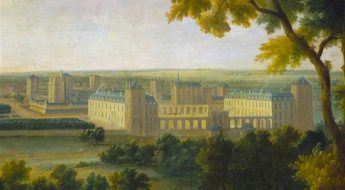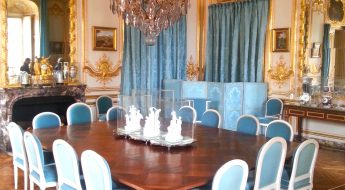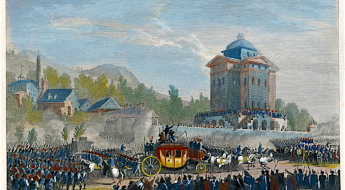Part 4.1 is the first part of Chapter 4.
A Childhood at Versailles consists of the first 5 chapters of the memoirs of Mme de Boigne (1781-1866), née Adèle d’Osmond, who was a French salon hostess and writer. She was born in the Château de Versailles and lived at the court of Louis XVI and Marie-Antoinette until her family fled to England during the Revolution. Later in her long life, she married a rich soldier of fortune 30 years her senior, hosted a brilliant salon in Paris, and became an intimate of the last French queen, Marie-Amélie, consort of King Louis Philippe (r. 1830-1848). Childless herself, Mme de Boigne addressed her memoirs to her grandnephew. The memoirs were not published until 1907, under the title Récits d’une tante, or An Aunt’s Tales. They’ve never been published in English, as far as I know, so I’ve decided to translate the first 5 chapters, the ones that take place mainly at Versailles, and post them here on this blog for interested readers to enjoy for free.
The chapters are quite lengthy, so I’ve broken each one into several parts. In Part 4.1, the Osmonds return to France in early 1790 after a brief, temporary exile in England. Mme de Boigne backtracks a little to tell a story about her father’s interactions circa 1788 with a certain Buonaparte family in Corsica.
A Childhood at Versailles, Chapter 4, Part 1 (4.1)
In the month of January, 1790, my father returned to France. Three months later we rejoined him. I have forgotten to say that he had quit the army in 1788 in order to embark on a diplomatic career. He had previously been the colonel of the Barrois infantry regiment, which was garrisoned in Corsica. He used to go there every year.
One of these trips gave rise to an episode that was quite unimportant at the time, but which has become interesting since. He was lodging at the home of M Malouet, the Intendant of the Navy and his friend, waiting for the wind to change and permit him to embark, when a Corsican gentleman asking to see him was announced. He had him ushered in; after a few reciprocal courtesies, this gentleman told him he desired to return as promptly as possible to Ajaccio, and and that since the only felucca in port had been chartered by my father, he begged him to ask the owner’s permission to let him take passage on it.
“That is impossible for me to do, monsieur, for the felucca belongs to me, but I would be very happy to offer you a berth on it.”
“But, Monsieur le Marquis, I am not alone, I have my son with me and even my cook, whom I am taking back.”
“Well, then, monsieur, there will be room for you and all your people.”
The Corsican thanked him profusely. The wind changed after a few days, during which they frequently came to see my father. They embarked. When dinner was served, to which my father invited the passengers, consisting of some officers of his regiment and the two Corsicans, he tasked an officer, M de Belly, with calling the young man dressed in the uniform of the École Militaire, who was reading at the other end of the boat. The latter refused to come. M de Belly came back irritated and said to my father, “I want to throw him into the sea, that little lout. He looks like a bad character. Do I have your permission, Colonel?”
“No,” said my father, laughing, “I do not permit it. I do not share your opinion; he looks like a promising character. I am persuaded that he will make his way.”
That little lout was the Emperor Napoléon. Belly has recounted this scene to me ten times: “Oh, if only the Colonel had permitted me to throw him into the sea” he would add, sighing, “he would not be upending the world today!” (It need hardly be pointed out that these words were spoken by the emigré Belly many years later.)
The day after arriving in Ajaccio, the elder M Buonaparte, accompanied by his whole family, came to make a visit of thanks to my father. This was the day that his relations with Pozzo di Borgo began. My father paid a visit to Mme Buonaparte. She lived in Ajaccio in one of the best small houses of the city, on the door of which was written in snail shells, “Long Live Marbeuf.” M de Marbeuf had been the protector of the Buonaparte family. Gossip had it that Mme Buonaparte was very grateful to him. At the time my father visited, she was still a very beautiful woman; he found her in the kitchen, without stockings, in a simple petticoat attached to a shirt, busy making preserves. Despite her beauty, she seemed to him to be suited to her work.
In Part 4.2, we will return to the ever-darkening clouds of the Revolution in the early days of the Court’s residence at the Tuileries.


















Leave a Comment